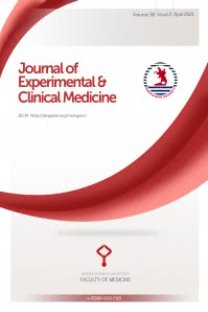Pediatrik yaş grubu sivil kranial ateşli silah yaralanmaları
Pediatrik yaş grubu kranial ateşli silah yaralanmaları nöroşirurji pratiğinde sık karşılaşılan durumlardan değildir. Ondokuz Mayıs Üniversitesi Tıp Fakültesi Nöroşirurji Kliniğinde 1990-1996 yılları arasında takip ve tedavi edilen 14 (8 erkek, 6 kız) pediatrik sivil kranial ateşli silah yaralanması olgusu bu tip olguların klinik ve radyolojik bulgularını incelemek ve komplikasyonlarım ortaya koymak amacıyla retrospektif olarak yeniden gözden geçirilmiştir. Arefleksik ve solunum arrestinde gelen 6 (%43) olgu dışında diğer tüm olgulara agressif cerrahi tedavi (acil kraniotomi, nekrotik beyin dokusu ve ulaşılabilen kemik ve metal fragmanların temizlenmesi, dekompresyon, hematom boşaltılması ve duraplasti) uygulandı. 7 (%50) olgu exitus olurken, 3 (%21) olgu nörolojik defisiti olmaksızın, 2 (%14) olgu hemiplejik, 2 (%14) olgu ise kronik bakım hastası olarak taburcu edildi, l (%7) olguda yara yeri enfeksiyonu ve BOS fistülü, 1(%7) olguda int-raserebral apse, 1(%7) olguda da subdural ampiyem gelişmiştir. Kranial ateşli silah yaralanmalarının agressif cerrahi tedavisi özellikle hasta ileri nörolojik fonksiyon kaybıyla birlikte gelmişse tartışmalıdır. Tedavi sonucunu etkileyen faktörleri hastanın gelişteki nörolojik durumu, radyolojik bulgular ve kurşunun hareket yönü ve hızı şeklinde sıralamak olasıdır. 14 pediatrik hastayı kapsayan altı yıllık deneyimlerimiz derin koma dışında agressif cerrahi tedavinin uygulanmasının gerekliliğim desteklerken, ağır nörolojik defisiti olan, radyolojik olarak iki hemisferi ilgilendiren, yr kaplayan lezyonu olan, ve kafa içinde yabancı cisim bulunduran olguların kötü prognoza sahip olduklarını göstermiştir. Glasgow Koma Skala Skoru 5 ve altında olan olgularda geniş cilt ve kemik defekti olmadığı sürece cerrahi tedavi uygulanmasının herhangi bir yararı yoktur.
Pediatric civilian gunshot wounds of the cranium
Pédiatrie civilian gunshot wounds of the cranium is relatively rare condition in the neurosurgical practice. The medical records of pédiatrie patients at our Neurosurgery Clinic (Ondokuz Mayıs University, Medical Faculty, Department of Neurosurgery) treated for civilian gunshot wounds of the cranium were reviewed to determine the clinical, pathological and radiological features, and the outcome of these lesions. In total, 14 (8 boys and 6 girls) children were cared for between 1990 and 1996. The agressive surgical treatment (urgent craniotomy, meticulous wound debridment and the removal of all accessible bone and bullet fragments, as well as other foreign materials, decompression, and evacuation of the hematoma) were performed all patients exept six patients who in condition of neurological areflexic and respiratuar arrest. 7 (%50) patients died. 3 (21%) patients with no neurological deficite, 2 (14%) patients with hémiplégie, and 2 (14%) patients with persistent vegetative state were discharged. The postoper ative complications included scalp wound infection and subcutaneous cerebrospinal fluid leaks (One patient, 7% ), intracerebral apse (one patient, 7%), and subdural ampiyem (one patient, 7%).The agressive surgical treatment of the gunshot wounds of the cranium is controversial, particularly the patient was brought deep comatose and unresponsive (areflexic) state. The prognostic factors included that the neurological state on arrival, radiological features, motivation for the shooting, and missile velocity. We have reviewed our experience over a period of 6 years with 14 pediatrie patients. Our experience has led us to purpose a agressive operative approach for patients with a Glasgow coma score of 6 to 15 on arrival. The patients having bihemisphere injuries with a Glasgow coma score of 3 to 5 on arrival, and particularly when combined with scattering of bone and metal fragments away from the bullet track, had worse prognose in our series. We believe that operative approach is unnecessary for patients having bihemisphere injuries with a Glasgow Coma Score of 3 to 5 on arrival, exept large defect of the scalp and skull.
